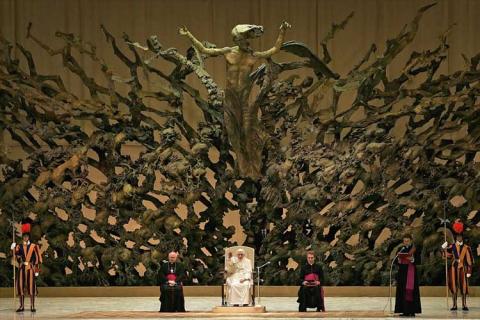By Cris Putnam
 Pin ItPope Benedict XVI preached on the Olivet discourse on Sunday 11/18/2012 in St. Peter’s Square. I guess its not too surprising that he twisted the text to mean something completely alien to its context but conforming to the works oriented righteousness of Romanism. Let’s keep in mind, “But even if we or an angel from heaven should preach to you a gospel contrary to the one we preached to you, let him be accursed.”(Ga 1:8) as we examine his explanation:
Pin ItPope Benedict XVI preached on the Olivet discourse on Sunday 11/18/2012 in St. Peter’s Square. I guess its not too surprising that he twisted the text to mean something completely alien to its context but conforming to the works oriented righteousness of Romanism. Let’s keep in mind, “But even if we or an angel from heaven should preach to you a gospel contrary to the one we preached to you, let him be accursed.”(Ga 1:8) as we examine his explanation: Jesus speaks of a future that is beyond our categories, and because of this Jesus uses images and words taken from the Old Testament, but, importantly, he inserts a new center, namely, himself, the mystery of his person and his death and resurrection. Today’s passage too opens with some cosmic images of an apocalyptic nature: “The sun will be darkened, the moon will no longer give its light, the stars will fall from the sky and the powers in the skies will be shaken” (Mark 13:24-25); but this element is relativized by what follows: “Then the Son of Man will come upon the clouds in the sky with great power and glory” (13:26). The “Son of Man” is Jesus himself, who links the present with the future; the ancient words of the prophets have finally found a center in the person of the Messiah of Nazareth: he is the central event that, in the midst of the troubles of the world, remains the firm and stable point.It is because this sort of nonsense that the term eisegesis was coined. It means reading meaning into a text rather than reading a meaning from a text. Its really so bad its hard to know where to start but I bolded two major errors. First, when Jesus said the he would come on the clouds with great glory he was referencing the son of Man passage in Daniel’s vision (Dan 7:13). He indeed identified himself as divine. Yet, Pope Benedict seems to deny that Jesus is speaking of cosmic judgement at His return. Yet that is exactly what he is speaking of, in fact, he was answering a question about the signs of his coming and (in direct contradcition to the infallible pope) the end of the world.
Another passage from today’s Gospel confirms. Jesus says: “The sky and the earth will pass away but my words will not pass away” (13:31). In fact, we know that in the Bible the word of God is at the origin of creation: all creatures, starting with the cosmic elements – sun, moon, sky – obey God’s Word, they exist insofar as they are “called” by it. This creative power of the divine Word (“Parola”) is concentrated in Jesus Christ, the Word (“Verbo”) made flesh, and also passes through his human words, which are the true “sky” that orients the thought and path of man on earth. For this reason Jesus does not describe the end of the world and when he uses apocalyptic images he does not conduct himself like a “visionary.” On the contrary, he wants to take away the curiosity of his disciples in every age about dates and predictions and wishes instead to give them a key to a deep, essential reading, and above all to indicate the right path to take, today and tomorrow, to enter into eternal life. Everything passes – the Lord tells us – but God’s Word does not change, and before this Word each of us is responsible for his conduct. It is on this basis that we will be judged.
Pope Benedict XVI “On the Coming of the Son of Man” http://www.zenit.org/article-35982?l=english
And as he sat upon the mount of Olives, the disciples came unto him privately, saying, Tell us, when shall these things be? and what shall be the sign of thy coming, and of the end of the world?(Mt 24:3, KJV)Doesn’t it seem odd that Jesus is addressing the very thing the pope says he is not? And finally, the pontiff just abandons the text entirely and spins it toward Romanist heresy with this canard, ” before this Word each of us is responsible for his conduct. It is on this basis that we will be judged” Anyone who is judged on his conduct will be cast into eternal hell, even our most righteous acts are like filthy rags (Isa 64:6). It is only those who have accepted that authentic Gospel who will have the righteousness of Christ imputed to them. A few passages come to mind:
“And to the one who does not work but believes in him who justifies the ungodly, his faith is counted as righteousness,” (Ro 4:5)
“For our sake he made him to be sin who knew no sin, so that in him we might become the righteousness of God.(2 Co 5:21)
“For by grace you have been saved through faith. And this is not your own doing; it is the gift of God”,(Eph 2:8)
In justification God imputes the righteousness of Christ to the believer, which cancels God’s judgment on the believer. It’s not based on conduct rather faith in Christ. “For we hold that one is justified by faith apart from works of the law.” (Ro 3:28)
Be warned, the pope is preaching a false Gospel that leads to damnation.

Read more of Logos Apologia at - http://www.logosapologia.org/